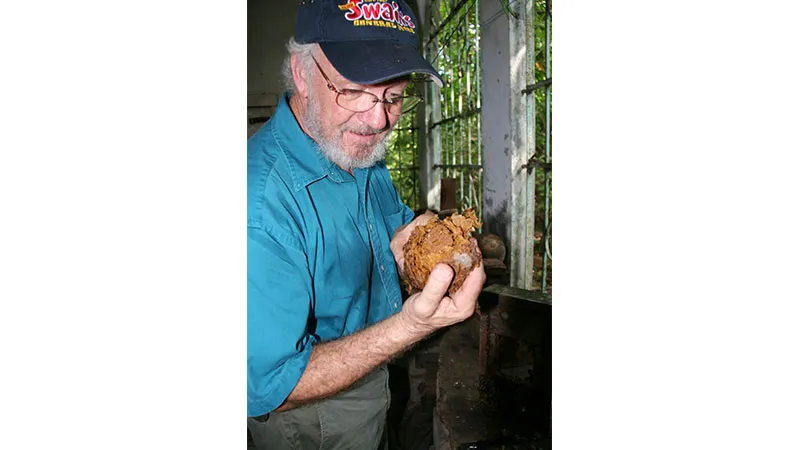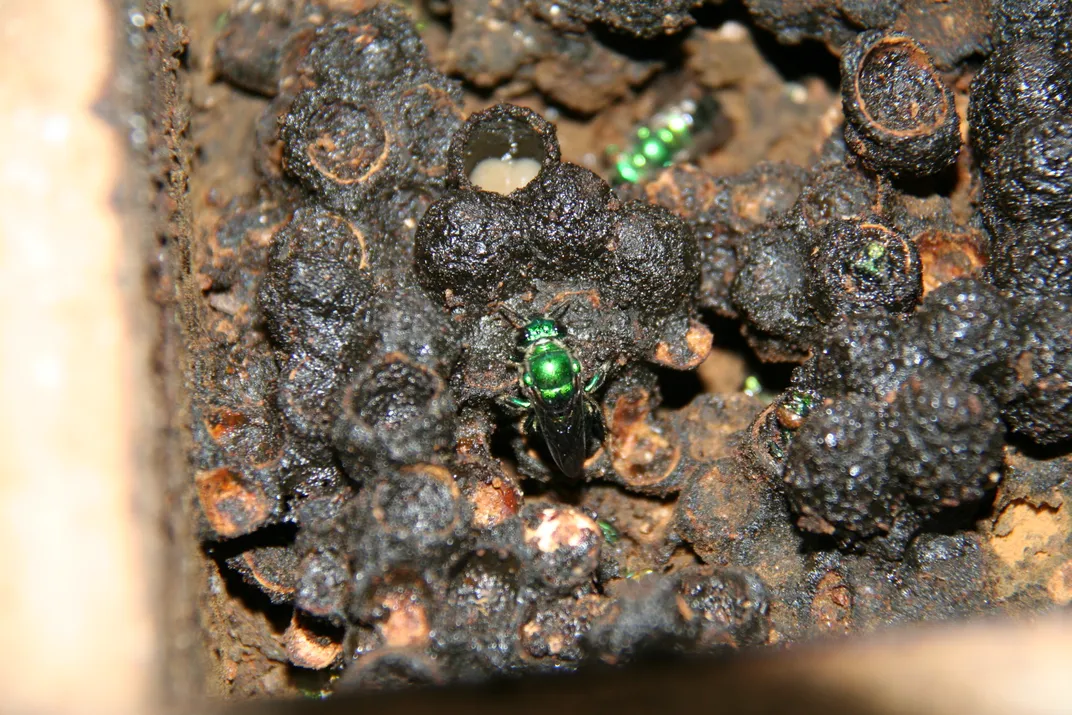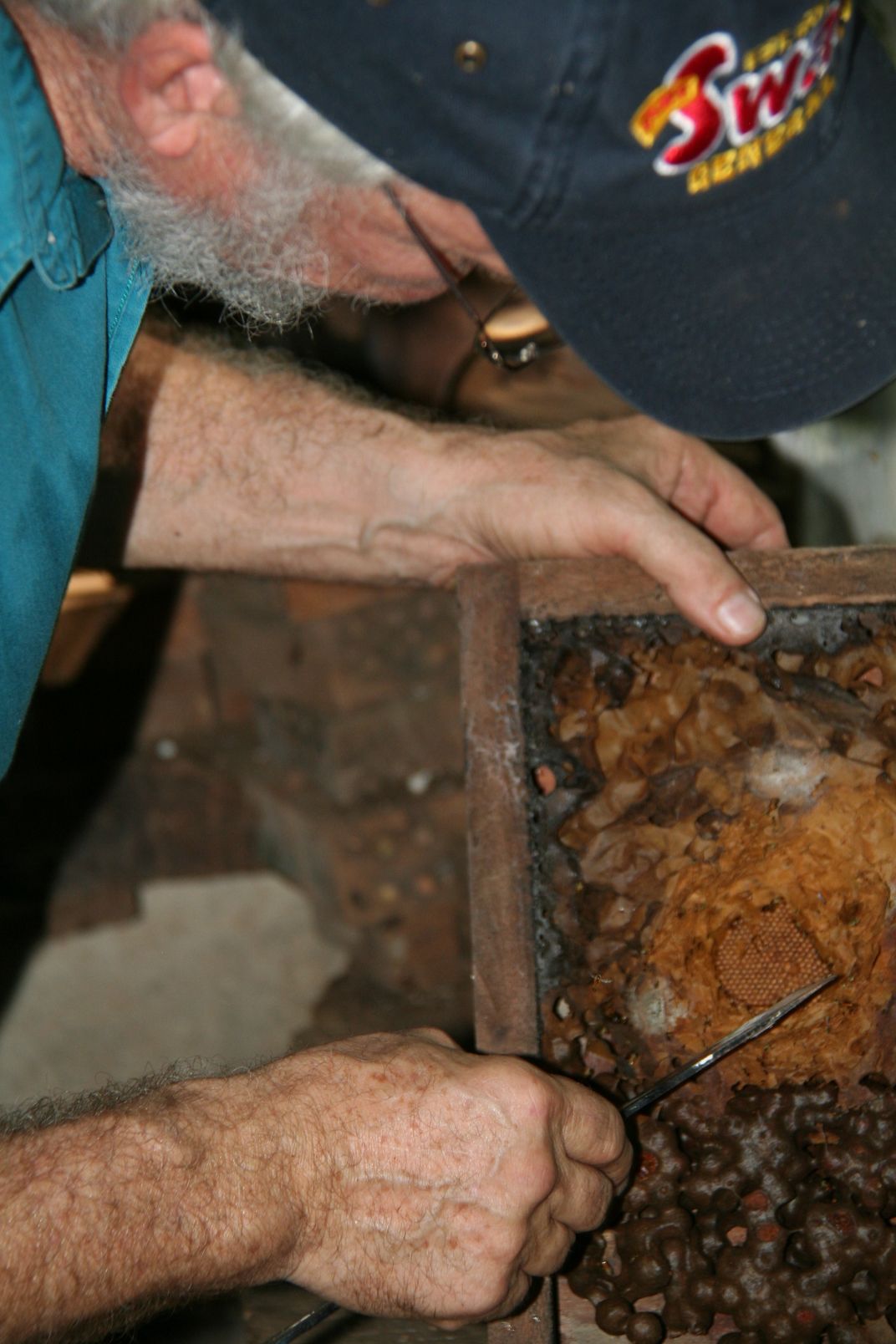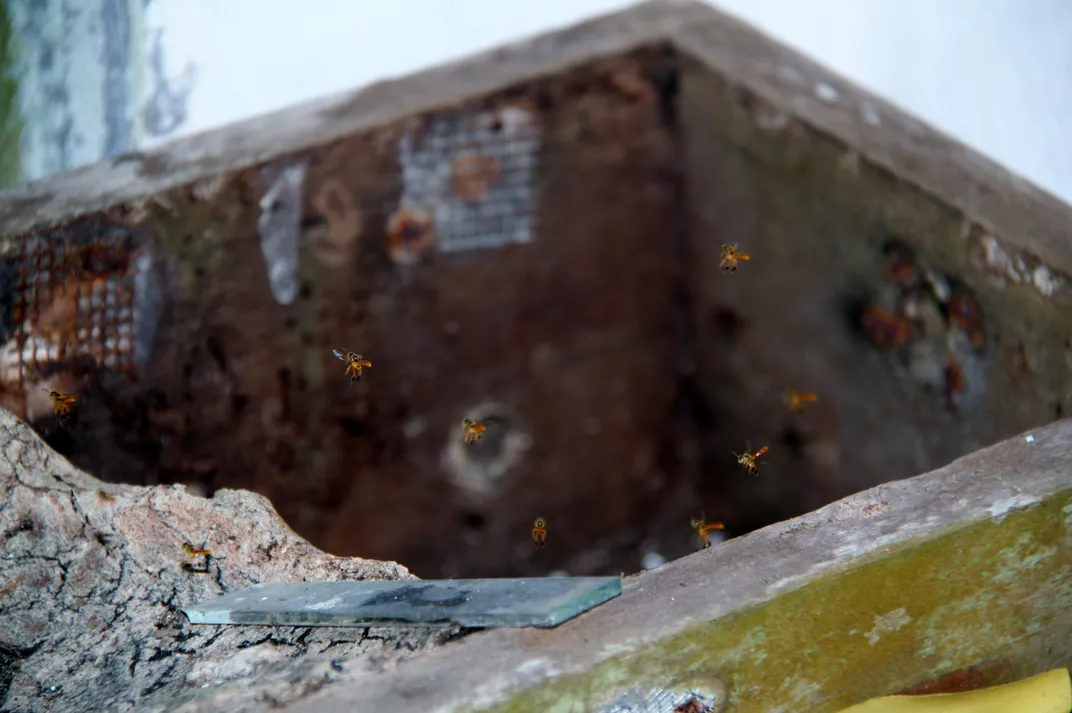Smithsonian’s Bee Man Delivers Up Some Advice for Dealing with Colony Collapse Disorder
David Roubik, who pioneered the field of tropical bee studies, says what will save them is a better understanding of their natural state
/https://tf-cmsv2-smithsonianmag-media.s3.amazonaws.com/filer/50/07/50073757-3dd4-472e-bb34-07b149cd9633/melipona_triplaridis.jpg)
In a quiet neighborhood on the outskirts of Panama City, David Roubik, one of the world's top bee experts, led me into a cramped workshop at the back of his one-story, red-roofed house, pried open a wooden chest filled with bees, and told me to stick my hand in.
The chest held a hive of Melipona triplaridis, a beefy black- and yellow-striped bee with sleek wings and a tan coat of hairs around its thorax. As Roubik does with many hives, he had brought this one home by sawing its cavernous, amber-hued wax layers out of a tree somewhere in Panama's tropical forests. He had just used a pocketknife to slice open a pea-sized pod on the hive's surface and revealed a tiny pool of gold.
“That's some of the best honey in the world,” he said. “Have a taste.”

It's easy to trust Roubik. He looks a bit like Santa Claus and always is on the verge of a chuckle, and as a staff scientist at Smithsonian's Tropical Research Institute (STRI) in Panama City for 35 years, he is one of the closest things on earth to a walking bee encyclopedia. During his tenure, he has revolutionized the study of bees in the tropics, and established himself as a renowned authority on bee varieties including the Meliponini tribe, orchid bees and the invasive Africanized honeybee. He has been stung, without exaggeration, thousands of times in his life—his personal record is 50 times in a day—but he assured me as I lowered my hand into the chest of bees that Melipona triplaridis actually can't sting; the species is one of roughly 550 tropical honey-making members of a tribe named Meliponini, commonly referred to as “stingless bees.”
Roubik now uses his expertise to combat the world's general ignorance about bees. Some scientific evidence suggests bees' numbers are dwindling as factors like climate change and deforestation disrupt ecological balances around the globe. Honey-producing bees, especially, have frequented the news in recent years due to worries of colony collapse disorder, the precise causes and actual prevalence of which are hotly debated. Honey bees are the world's primary pollinators, used commercially to grow hundreds of billions of dollars of crops each year, so a major loss would be economically catastrophic. But Roubik says there is much to be understood about bees' lives and our influence on them before we start to panic.
“I'm electrified by bees,” he told me once I had poked my finger through the scampering crowd in front of me and sampled their hard-earned honey. It was tangy, soft and delicious as promised. I followed him to another wooden box, this one home to a hive of metallic green orchid bees named Euglossa imperialis. “Bees go everywhere and do everything," he added. "I love watching them interact with their environments and each other, discovering the amazing things they do by direct observation.”

Roubik's patience and inventiveness as a bee observer, in fact, is largely what has distinguished him among experts. Bee research often takes place in apiaries or labs, but Roubik prefers to study bees in the wild, having spent years, if not decades, hiking the forests in Panama, where he can sample and monitor bees in their natural environments, and gather otherwise unobtainable data on details like the flowers they prefer, their foraging habits and how they get along with other species.
“I study nature, where it exists,” he told me. “Bees have basically nothing to do with apiaries or labs. Their artificial congregation there leads to problems and behaviors that do not exist in a normal ecological or evolutionary setting.”
A lauded taxonomist, Roubik collects specimens as he goes about his field studies, often by bringing a chainsaw on his drives deep into the forest and hiking around until he finds trees they live in. To identify new species—he has discovered more than 30—he spends hours over a microscope examining details as minute as the lengths of bees' hairs and the shapes of small, jagged teeth along their mandibles.
“David is basically a pioneer,” says James Nieh, head of a prominent bee research lab at the University of California-San Diego, who remembers being amazed by the dedication required to gather even the most basic information about tropical bees the first time he collaborated with Roubik at STRI. (Researchers of western honeybees, by contrast, can order their bees by mail, he notes.) “If we think back to people who founded this area [of tropical bee biology], in a modern sense, David is in that group of illustrious people who have posed a lot of very interesting questions: How do these bees live? What is their basic biology? How do they find food? These are all fascinating types of things that he has studied, which other scientists will carry into the future.”
/https://tf-cmsv2-smithsonianmag-media.s3.amazonaws.com/filer/b3/c5/b3c5e1a5-70cc-409d-bf37-3bb8f84bd130/bees_on_hand.jpg)
As the future of bees increasingly becomes a concern, however, Roubik has focused his energy more and more on being a public voice of reason. The scientist now jokingly likes to call himself a "consultant," because he spends less time researching and more time sharing his expertise in workshops and planning committees around the world to devise best practices for managing bees. (In our e-mail correspondence following my visit, almost every message he sent arrived from a different country.) His goal is to spread good information about the insects, not to sensationalize; while the possibility of world-wide spontaneous colony failure is worth looking into, he told me, the colony disappearances that are grabbing headlines frequently are caused by natural fluctuations or human error, not a pandemic.
“One benefit of doing long-term studies is that I see what happens when an El Niño year comes in the tropics, which causes sustained and super-productive flowering and feeds a lot more bees than the normal,” he said. “This makes populations go up and then go down—they're supposed to do that. After a year or two of big decline people will start saying Henny Penny the sky is falling, but you can't predict anything on the basis of one or two years of study. Stability is not the norm, not here or anywhere else.”

He shared anecdote after anecdote of what he referred to as the "stupidity of people” as he introduced me to a few more hives around the back of his house: things like major beekeepers being mystified by their bees' falling numbers as they fed them nutrient-deficient high-fructose corn syrup, and farmers exclusively planting clones of a self-sterile apple tree then worrying all the bees in their region had died off when the apples weren't pollinated. Recently, he flew down to the Yucatán Peninsula to advise farmers who reported alarming hive losses, only to discover they simply were failing to replace aging colonies.
“Things may be obvious to me, but other people aren't looking at the same things I am. This is totally obscure for most people,” he said, noting that he was one of only two people in the world who had the field data to show individual Yucatán colonies could only last about 20 years. “I've always felt a sense of obligation. I know I can help in certain areas, and I also know I'm often about the only person who can.”

After I had met his various bees, Roubik walked me to the front of his house and we settled onto a shaded bench, one of many wooden things around the place that he has hand crafted from the wood from fallen trees he has collected during his forest ramblings. Reflecting on his frustration with how little is known about bees, he admitted that ignorance is also part of the fun; there are around 21,000 known bee species in the world and thousands more to be named, and scientists are “still discovering new things bees do that we didn't have any idea they were doing,” he said. Only recently did scientists realize some bees forage at night, for instance. Some bees use smaller bugs to make honey for them. And there even are a few species that feed on flesh, which Roubik himself discovered in the 80s when he tossed a Thanksgiving turkey carcass into his backyard.
“That's the beauty of the research,” he said. “Because we're still short on info, everything's worth knowing about.”
/https://tf-cmsv2-smithsonianmag-media.s3.amazonaws.com/accounts/headshot/paul-bisceglio-240.jpg)
/https://tf-cmsv2-smithsonianmag-media.s3.amazonaws.com/accounts/headshot/paul-bisceglio-240.jpg)